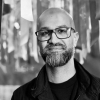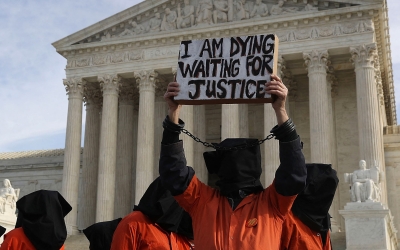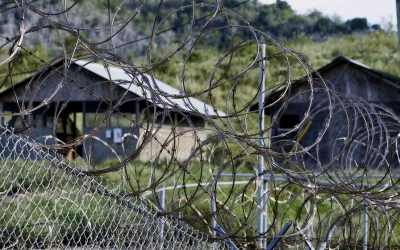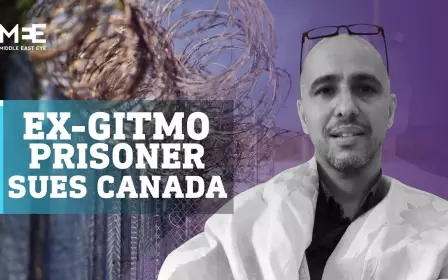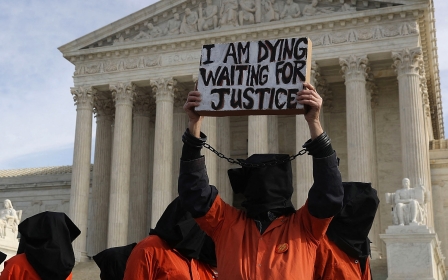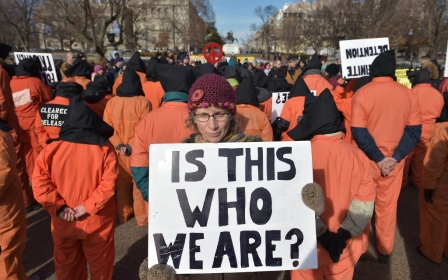The silencing of a dangerously flawed film is not censorship
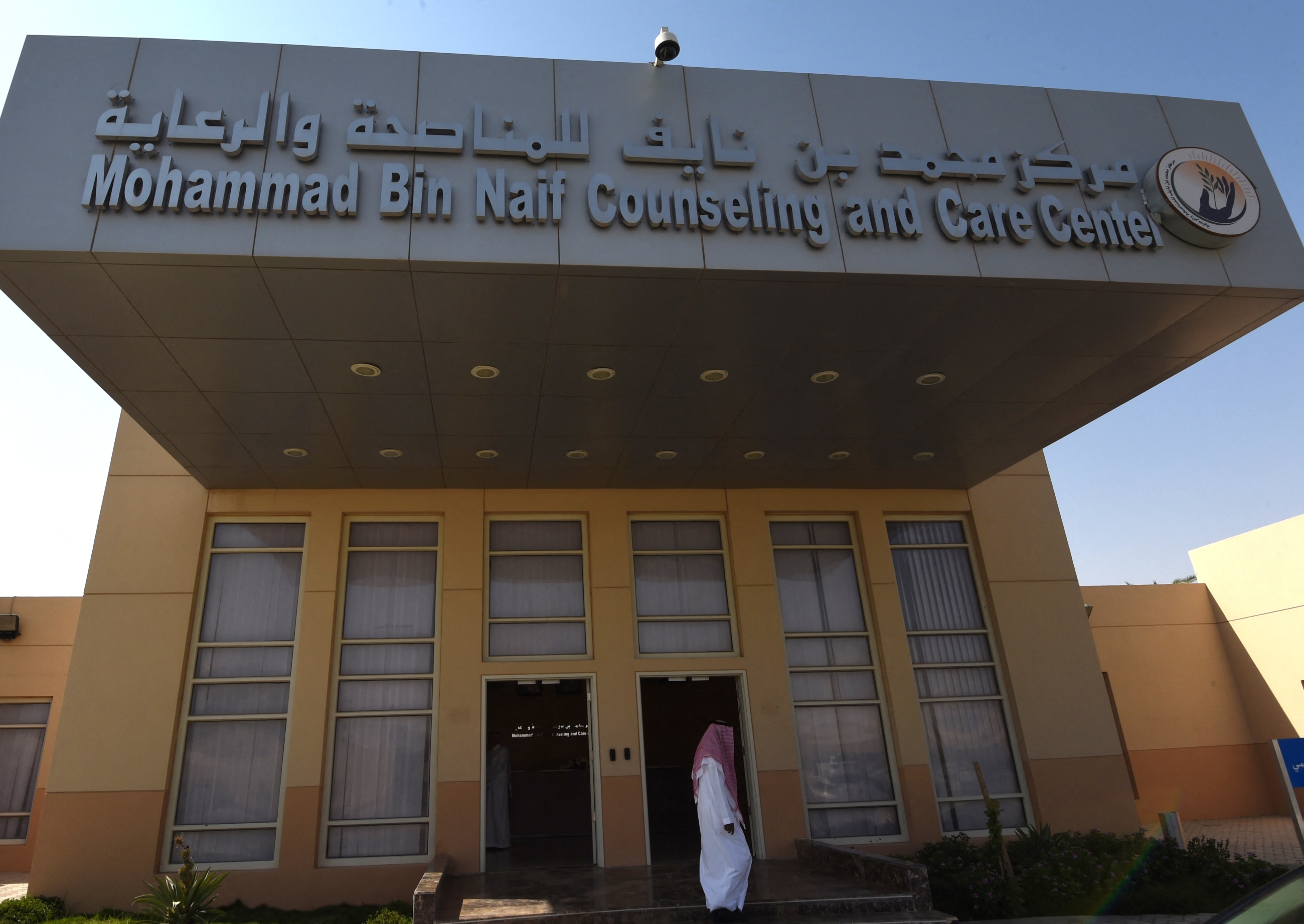
It was interesting to witness last week liberal America coming to the defence of filmmaker Meg Smaker, after her documentary, Jihad Rehab, came under criticism earlier this year for what appeared to be an unconscionable presentation of former Guantanamo Bay detainees held for "rehabilitation" at a Saudi Arabia re-education facility.
The facility was tailor-made in order to "de-radicalise" Muslims who had been suspected of terrorism.
As part of the Saudi government's acceptance of detainees who had been held at Guantanamo Bay, they were required in their agreement to hold released detainees at the centre until they had gone through a religious and political re-education.
Smaker’s film centres on four former Guantanamo Bay detainees and seeks to find out about their lives and whether or not they have been truly re-educated.
New MEE newsletter: Jerusalem Dispatch
Sign up to get the latest insights and analysis on Israel-Palestine, alongside Turkey Unpacked and other MEE newsletters
A 'repressive' environment
Before the release of the film, I was contacted by former Guantanamo Bay detainees who were concerned over not only the content, but the set-up of the interviews.
From the very beginning the question hung in the air: how is Smaker, or indeed any filmmaker, going to mitigate the intense scrutiny and sanitised environments that the Saudi regime would inevitably inject into any such film?
The reality for most Muslims living under regimes of repression is that silencing and self-censoring has become a habitual survival skill
One only needs to take a cursory look at the work of human rights organisations such as Sanad to gain insight on how the slightest criticism of the Saudi regime and its accompanying institutions results in detention with accusations of sedition and terrorism.
Despite this exceptionally repressive environment, we are encouraged to believe that Smaker’s film was able to cirumvent this system of violence and provide agency to the men she was interviewing.
Yet, throughout, it is the elephant in the room. How can anyone trust that these men are opening themselves up fully without the fear of repercussion on their lives, and the lives of their families?
Perhaps Smaker has not engaged with literature around the global War on Terror and the manifold ways in which silencing occurs.
The reality for most Muslims living under regimes of repression and Islamophobia is that silencing and self-censoring has become a habitual survival skill, particularly when white liberalism is unaware of the violence that sits behind the questions it asks.
Knowing full well how Muslims in so-called free societies regularly self-censor, it is not beyond the scope of imagination that Smaker’s interview subjects were fully aware of the power dynamics in the interview.
Ultimately, they would never have been permitted to sit in front of the camera without being perfectly aware of the consequences of stepping outside an accepted narrative.
A disingenuous defence
The cancelling of Jihad Rehab at the Sundance Film Festival has resulted in a defence that has been chiefly staged at The New York Times.
An article by Michael Powell argues that Smaker's film, later called The UnRedacted, was cancelled because "Muslim critics didn't" like it, suggesting they rejected it because they don’t believe that a white person should be telling these stories.
Powell mentions the names of a few Muslim journalists, but one that particularly stood out for me is Assia Boundaoui, whose critique is reduced crassly to: white saviours shouldn’t tell our stories.
In fact, as Boundaoui highlights in a Twitter thread, the chief critique was always that Smaker had crossed ethical lines in placing the safety of her subjects in harm’s way.
As someone who intimately understands the contours of state intrusion, Boundaoui is in fact best placed to be concerned about the ways in which states interfere in the lives of those it deems suspect.
Further still, why did Powell and the New York Times focus so much on indy filmmakers such as Boundaoui, rather than former Guantanamo Bay detainees who had written an open letter explaining not only the harms caused by the film, but also how Smaker had not been fully upfront with the Yemeni men she interviewed at the detention facility?
One might suggest this is largely because it is much more difficult to simply ignore the knowledge and experience of Guantanamo Bay detainees who had once been subject to the violence of a system that is at the centre of this documentary.
As former Guantanamo Bay detainee Mansoor Adayfi has been at pains to explain, Smaker is not only accused of exploiting her interview subjects without taking full measure of their situation and consent, but also that she behaved as an interrogator in the course of her interviews.
When one considers the position that the freedom of the men being interviewed rests on the public declaration of having been rehabilitated through the detention facility, Smaker’s questioning of them requires them to repeat untruths about themselves that were manufactured through the use of torture in sites that included Bagram and Kandahar airbases, and Guantanamo Bay.
Coercive questioning
Rather than attempting to question how claims that were made in US documents were tested in an open and fair system, Smaker relies predominantly on US Department of Defence documents that painted the men as being guilty of terrorism – entirely gleaned through torture.
Smaker is not only accused of exploiting her interview subjects without taking full measure of their situation and consent, but also behaved as an interrogator
Smaker’s uncritical use of these assessments only speaks to her own blindness to the plight of her subjects, particularly in reproducing the notion that they required rehabilitation. As former Guantanamo Bay detainees wrote in their open letter to the makers of the film,
"Little care was paid to the reproduction of interrogation-like questioning through a coercive and captive environment within the filming itself. Meg’s insistence on the men answering questions was uncomfortable viewing for those of us who were forced to endure such lines of questioning in the past, and made us deeply concerned about the lack of psychological support for the men in the film.
… the very notion of 'future dangerousness' in 'curing' people has a very long and troubling history across the globe. In the War on Terror context, this idea has been used to indefinitely detain Muslims based on the construction of their inherent criminality and irredeemability. Had you conducted any form of research around rehabilitation programmes and their underlying and often faulty rationales, even within the US, you might have produced an entirely different presentation on the efficacy of such programmes."
After the release of the New York Times article, a number of personalities from the world of filmmaking stepped into the debates over the documentary in order to stage a defence of Smaker’s work.
I was particularly surprised to see the Oscar-winning director Alex Gibney writing a thread on Twitter decrying the cancelling of the film. Gibney framed the demands by campaigners over the film as intending to "silence voices and censor films" due to accusations of racism.
Gibney’s framing is strange, particularly because the very communities he is criticising welcomed his own 2007 documentary, Taxi to the Dark Side, which featured some of the men who were now taking issue with Smaker’s film.
The critiques levelled at Smaker were never really centred on the fact that she is a white director, but rather focused almost entirely on the way in which she set up the former Guantanamo Bay detainees in their interviews, let alone publicly and in a film that they had little to no idea would be shown at an international film festival.
When Muslim critics enter into the debate around the film, it is not simply because they see racism in the construction of the film, but understand fully the consequences of such racist depictions in their own lives.
Former Guantanamo Bay detainees, entirely innocent, still live with the consequences of false reports having been produced about them by US torturers and interrogators, and so in any such discussion, we must listen closely to the concerns they raise, rather than deflect their concerns as some kind of attempt at silencing or censoring a film.
The views expressed in this article belong to the author and do not necessarily reflect the editorial policy of Middle East Eye.
Middle East Eye delivers independent and unrivalled coverage and analysis of the Middle East, North Africa and beyond. To learn more about republishing this content and the associated fees, please fill out this form. More about MEE can be found here.


